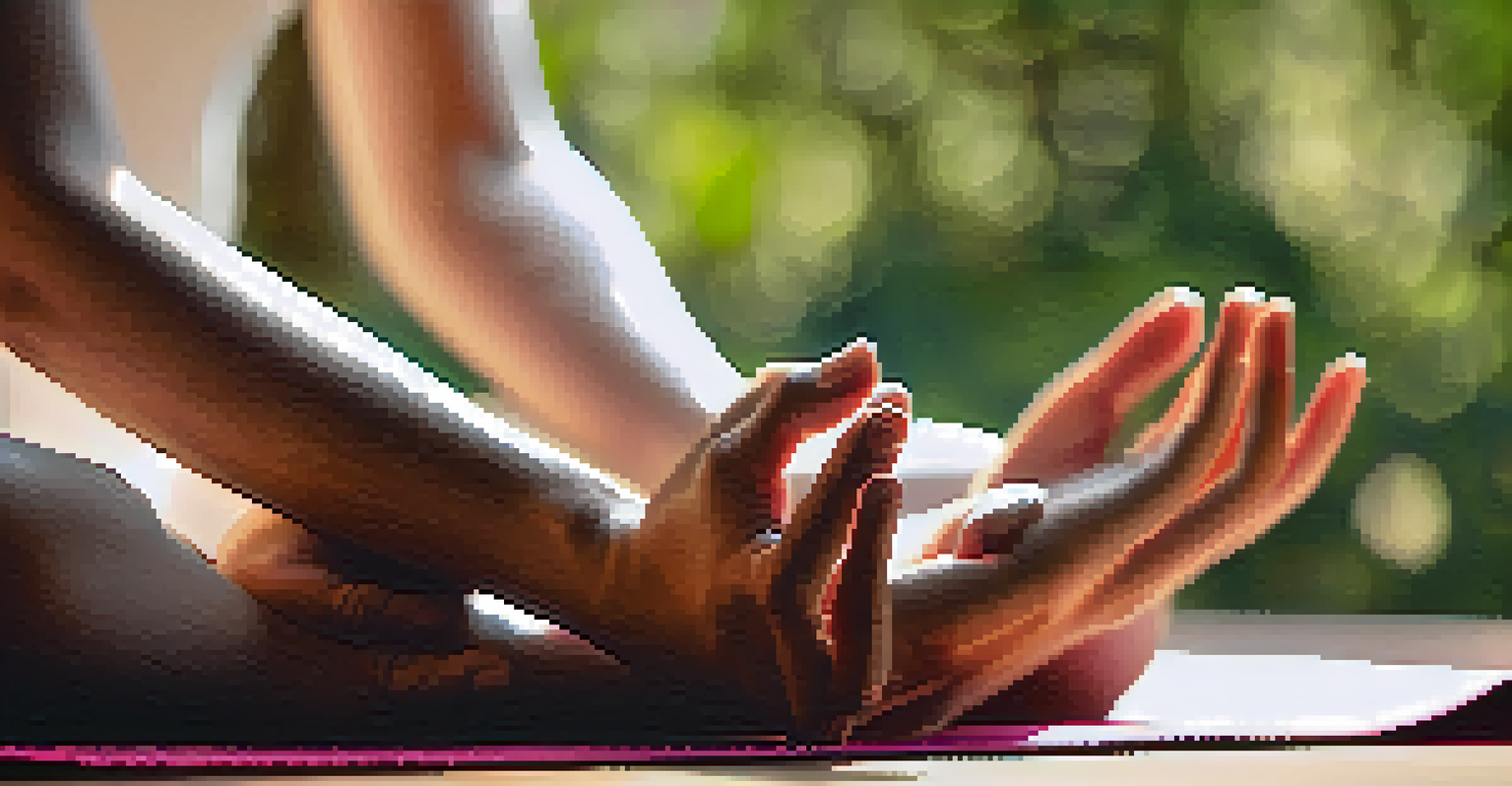Mindfulness Through Yoga: A Path to Self-Improvement

Understanding Mindfulness and Its Benefits
Mindfulness is the practice of being present in the moment, fully engaged with what you're doing. It encourages awareness of your thoughts, feelings, and surroundings without judgment. This state of being can lead to reduced stress and improved emotional regulation, making it a powerful tool for personal growth.
Mindfulness isn't difficult, we just need to remember to do it.
When you practice mindfulness, you begin to notice the patterns in your thoughts and behaviors. This awareness is the first step toward making positive changes in your life. For instance, you might realize that you often react negatively to stress, allowing you to address that response more constructively.
Incorporating mindfulness into your daily routine can enhance your overall well-being. Whether through meditation or simply taking a moment to breathe deeply, these practices can help ground you and cultivate a more peaceful state of mind.
Yoga as a Gateway to Mindfulness
Yoga is not just about physical postures; it’s a holistic practice that combines movement, breath, and meditation. Each session offers an opportunity to connect with your body, fostering a deeper awareness of how you feel. This connection is crucial for cultivating mindfulness.

As you flow through various poses, you learn to focus on your breath and the sensations within your body. This focus takes your mind off distractions and anchors you in the present moment. Over time, this practice builds your capacity for mindfulness in other areas of your life.
Mindfulness Reduces Stress
Practicing mindfulness helps you become aware of your thoughts and feelings, leading to reduced stress and improved emotional regulation.
For many, yoga serves as a moving meditation. The combination of breath and movement creates a rhythm that can calm the mind, making it easier to let go of stress and anxiety while promoting a sense of inner peace.
The Role of Breath in Yoga and Mindfulness
Breath is a fundamental aspect of both yoga and mindfulness practices. In yoga, breath control, known as pranayama, enhances your ability to focus and stay present. This connection between breath and mindfulness helps anchor you during moments of stress or distraction.
Yoga is the journey of the self, through the self, to the self.
When you become aware of your breath, you tap into a powerful tool for grounding yourself. For example, when you feel overwhelmed, taking a few deep breaths can help slow your heart rate and calm your mind. This simple act can shift your perspective and improve your emotional response.
Integrating mindful breathing into your daily life can be transformative. By consciously breathing, you can create a moment of pause, allowing you to respond thoughtfully rather than react impulsively to challenging situations.
Setting Intentions for Your Yoga Practice
Setting intentions is a powerful way to enhance your yoga practice and cultivate mindfulness. An intention serves as a guiding principle that can help you stay focused during your sessions. It’s about choosing a meaningful goal, whether it’s to cultivate patience, strength, or self-love.
For instance, if your intention is to practice self-acceptance, you might approach each pose with kindness toward yourself. This mindset can transform a physical workout into a journey of self-discovery and improvement. Intentions shift your focus from external achievements to internal growth.
Yoga Enhances Mindfulness Practice
Yoga combines movement, breath, and meditation, creating a holistic practice that fosters mindfulness and a deeper connection to the present moment.
Incorporating intentions into your practice can also lead to greater clarity in your daily life. By regularly reflecting on your goals, you become more aware of your choices and actions, ultimately guiding you toward self-improvement.
Building a Mindful Yoga Routine
Creating a mindful yoga routine is about more than just going through the motions; it’s about being present in each moment. Start by choosing a time and space where you can focus solely on your practice. This environment can significantly enhance your ability to engage with your body and mind.
Incorporate a variety of poses that resonate with you and allow time for both movement and stillness. A balanced routine might include energizing poses to open your body and restorative poses to relax your mind. Remember, it’s essential to listen to your body and adapt your practice to fit your needs.
Consistency is key to building mindfulness through yoga. By setting aside dedicated time for your practice each week, you’ll deepen your connection to mindfulness and self-improvement, creating a routine that nurtures your mind, body, and spirit.
Overcoming Challenges in Your Mindfulness Journey
Like any personal growth journey, practicing mindfulness through yoga can present challenges. You may experience distractions, physical discomfort, or emotional resistance as you explore your inner self. Acknowledging these challenges is the first step toward overcoming them.
When you encounter difficulties, try to approach them with curiosity rather than judgment. For example, if you find your mind wandering during meditation, gently guide your focus back to your breath without self-criticism. This approach fosters a compassionate mindset, essential for self-improvement.
Intentions Guide Your Journey
Setting intentions in your yoga practice serves as a guiding principle, encouraging internal growth and clarity in your daily life.
Embracing the ups and downs of your practice will ultimately lead to growth. Each challenge offers an opportunity to learn about yourself, helping you develop resilience and a deeper understanding of mindfulness.
The Lasting Impact of Mindfulness Through Yoga
As you cultivate mindfulness through yoga, you'll likely notice a ripple effect in other areas of your life. The skills you develop—such as patience, focus, and self-awareness—can enhance your relationships, work performance, and overall happiness. It’s about taking that sense of presence off the mat and into your daily interactions.
For instance, practicing mindfulness can improve communication skills. You'll become more attuned to your emotions and those of others, which can lead to deeper, more meaningful connections. This awareness can also help you navigate conflicts more effectively, fostering healthier relationships.

Ultimately, mindfulness through yoga is a lifelong journey. By committing to your practice, you’re investing in your personal growth and well-being, paving the way for a more fulfilling and balanced life.